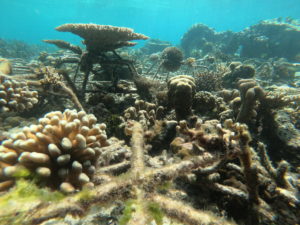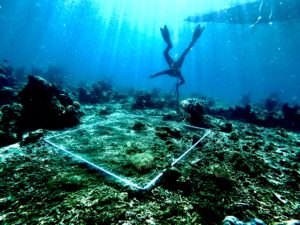Words by Ben Williams, 2019 BioScience Graduate
Most people are aware coral reefs throughout the world are struggling one way or another. A range
of issues are responsible including overfishing, pollution and climate change induced bleaching to
name a few. However, coral reef communities provide valuable ecosystem services to a vast number
of individuals, it’s estimated One Billion people have some degree of dependence on these
ecosystems. With much of the world’s reefs degraded or lost it makes conserving those that remain
vital, and restoration of former reefs an important endeavour to many individuals.
The Marine Bioacoustics group in Exeter focuses much of their efforts on understanding the
soundscapes of coral reefs. These soundscapes encompass the entirety of the sound that can be
heard on particular spots of the reef and can be collected using underwater microphones we call
hydrophones. Emerging research suggests a lot can be determined about a reef from a few key
parameters within its soundscape which could be used to indicate the health of the surrounding
reef. A great example is shown in the spectrograms below, where you can hear an audible difference
between the soundscape of a healthy reef and that of a degraded reef:
This short acoustic clip first plays us the buzz of a healthy reef, followed by the quieter setting heard on a degraded reef
A group of us from Exeter’s Marine Bioacoustics group are currently out in Indonesia exploring reef
acoustics further. We’re collaborating with a project set up by Mars™, who have been working on an
intuitive way to restore the reefs in South Sulawesi. They use two key methods in doing so, the first
is coral propagation, where small samples of coral are clipped off live colonies and transported
somewhere new where they grow back at a faster rate than if left on their original colony. The next
step is to attach these to a skeleton system they call ‘Spiders’, which provide a substrate for new
corals to colonise and elevate them slightly above the reef bottom to provide the water flow needed
to bring nutrients to the growing coral. The Mars™ project has implemented large areas of these
spiders around two islands off Makassar with an impressive degree of success in their ability to
restore the reef.

Our team from Exeter is particularly interested in the difference between the soundscapes of healthy and degraded reefs. We’re visiting the Mars™ restoration efforts to help explore the differences in soundscapes between their restored sites, degraded sites and baseline healthy sites. The hope is that in the future we will be able to show restored sites match the soundscape of healthy sites, and a quantifiable difference between the restored sites and degraded sites will be observable. We’re trialing this out using hydrophones which we’ve been placing daily on different sites within the reefs to determine whether this is a feasible methodology in comparing the reef soundscape.

We’re also exploring the possibility of using ‘soundscape enhancement’ to help fine tune the ecology of the reef at a local scale to bring about restorative impacts. This is a highly innovative approach in which submersible loudspeakers are placed on patches of degraded reefs where they play recordings that may help recovery of the reef. A proof of concept of this was only recently provided in a 2018 study authored by Tim Gordon, who is now leading the expedition out here in Indonesia, and other members of the
Marine Bioacoustics group. The study found that larval and juvenile recruitment was greater at sites where healthy reef noise was played compared to sites where degraded reef noise was played. The use of soundscape enhancement is therefore of a great interest to restoration programmes like Mars™ in Indonesia, and we’re also out here to help them investigate whether this could be a potentially useful tool for their restoration. This time we’re trialing playback methods that could be used to affect the ecology of adult fish within the reef, primarily regarding their grazing behaviour which is a key process in controlling algae overgrowth at degraded sites.
#ExeterMarine is an interdisciplinary group of marine related researchers with capabilities across the scientific, biological, medical, engineering, humanities and social science fields.
Find us on: Facebook : Twitter : Instagram : LinkedIn
If you are interested in working with our researchers or students, contact Michael Hanley or visit our website!
